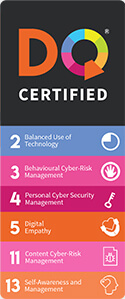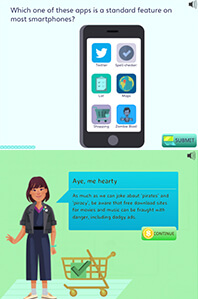What is the
DQ Index
We can’t progress thoughtfully unless we measure, and what we measure serves as a guide for our future. Most of today’s major indices measure a nation’s success in the digital economy by the level of nations’ hard infrastructure and technology enablers. These are important, but they are not enough.
A Digital Intelligent Nation means that its citizens and organizations have holistic competencies to achieve well-being, prosperity, and safety/security in the digitized society.
The DQ Index aims to be a single, standardized, and searchable metric to measure the level of digital intelligence of nations. In other words, it measures the progress of human-centred digital transformation of nations.
The DQ Index is designed to be an aggregated measurement for the following thematic areas by co-defining the “digital competence” of all stakeholders in the ecosystem, thereby continuing to be relevant, evolving, and transparent. Each thematic area is a result of an international collaborative research together with partners. The DQ Index will be constantly updated with growing participation, collaborative research, and global databank.
Check-out our work-in-progress collaborative R&D with various partners. The inaugural real-time DQ Index with the outcomes will be released in 2022.
| 7 PILLARS | Questions that are Being Measured |
|---|---|
| Child Online Safety | Are children able to use technology safely, responsibly, and ethically with proper protection and guidance from their caregivers, schools, and society? |
| Digital Enablement and Resilience | Are citizens equipped with basic digital skills to use technology successfully while being resilient to various cyber-threats and risks? |
| Digital Skills for Life-Long Learning | Do nations have formal and informal education systems that provide quality digital intelligence education and training for life-long learning? |
| Digital Wellbeing | Are citizens able to maintain their wellbeing in the digitized society? |
| Workforce Digital Skills | Is labour equipped with the right mindset and skills to welcome technological changes in the workplace, and to maximize the benefits of the digital workplace? |
| Digital Equity | Do women and individuals from underserved communities have access to full digital participation and digital skills to make meaningful change through technology? |
| Digital Infrastructure | Do nations have hard- and soft- infra structure that ensure technology adoption and advancement? |
For each thematic area, we co-design meaningful indicators across the three main dimensions. Join us in developing indicators that contribute to the design and implementation of effective policies and practices that drive to close the digital skills gaps.
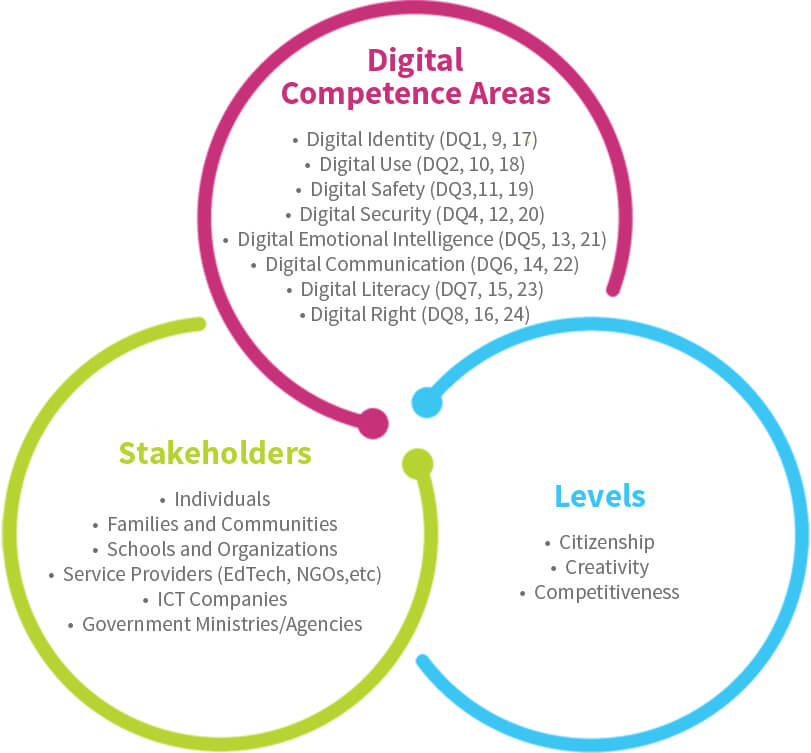
In the education sector, a single standard rarely dictates what must be adopted. Each country or company can have their own digital skills framework / program tailored to their own digital transformation agenda. Through the DQ technology, different frameworks and programs from all over the world can be mapped and aligned under a common taxonomy based on the IEEE DQ Global Standards (IEEE 3527.1TM). Just like how the SWIFT code facilitates inter- banking transactions, the IEEE DQ Global Standards can serve as the inter-operable common language that translates competencies in one framework to match to another’s. It provides a theoretical basis to connect education programs, assessment tools, and analytical systems from different frameworks within one standardized index. Thus, the DQ Index can measure the level and progress of digital intelligence of nations in an integrated manner that is standardized and searchable.
The current UN Sustainable Development Goals (SDG) measurement indicators have not yet fully laid out digital components. The DQ Index aims to be directly aligned with several Sustainable Development Goals (SDG 4, SDG 8, SDG 10) and support to the development of indicators related to the digital ecosystem. Learn More.
how it
works

We make digital skills development and measurement easy, fast, and cheap.
DQ Technology enables any nation, company, group, or organization to:
- Create or enhance their own programLearning, Assessment, Framework, Research, Technology, or Policy even those who do NOT have expertise in digital skills
- Measure their impact through global benchmarking linked with the DQ Index, and
- Align any existing programLearning, Assessment, Framework, Research, Technology, or Policy to be aligned with the DQ Index
All this at a remarkably reduced time and cost through the simple 5-step ABCDE strategy. This allows you can measure your impact and progress in digital empowerment as an essential part of your national or organizational digital transformation.
The 5-Step ABCDE Strategy:

-
A
Align with IEEE DQ Global Standards
a) If you have your programLearning, Assessment, Framework, Research, Technology, or Policy, we can help you in aligning it to the DQ Global Standards in a granular level through our DQ Micro-Badge (MB) systemThe DQ Micro-Badges are a set of micro-units of competencies based on the taxonomy of the DQ Global Standards that can serve as the building blocks for learning modules and assessment design..
b) If you want to create a new program, pick and choose the DQ MBsThe DQ Micro-Badges are a set of micro-units of competencies based on the taxonomy of the DQ Global Standards that can serve as the building blocks for learning modules and assessment design. based on your digital transformation agenda.
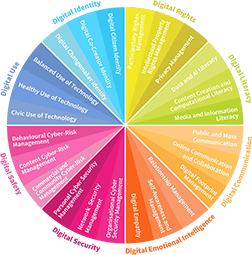
-
B
Benchmark International Programs
We’ll help you identify the international reference programs in the DQ program bank that have the best content in relation to your DQ MBs identified in Step A. By comparing your program with selected international benchmarks, you can identify your program’s strengths and weaknesses, and enhance the areas for improvement as necessary.
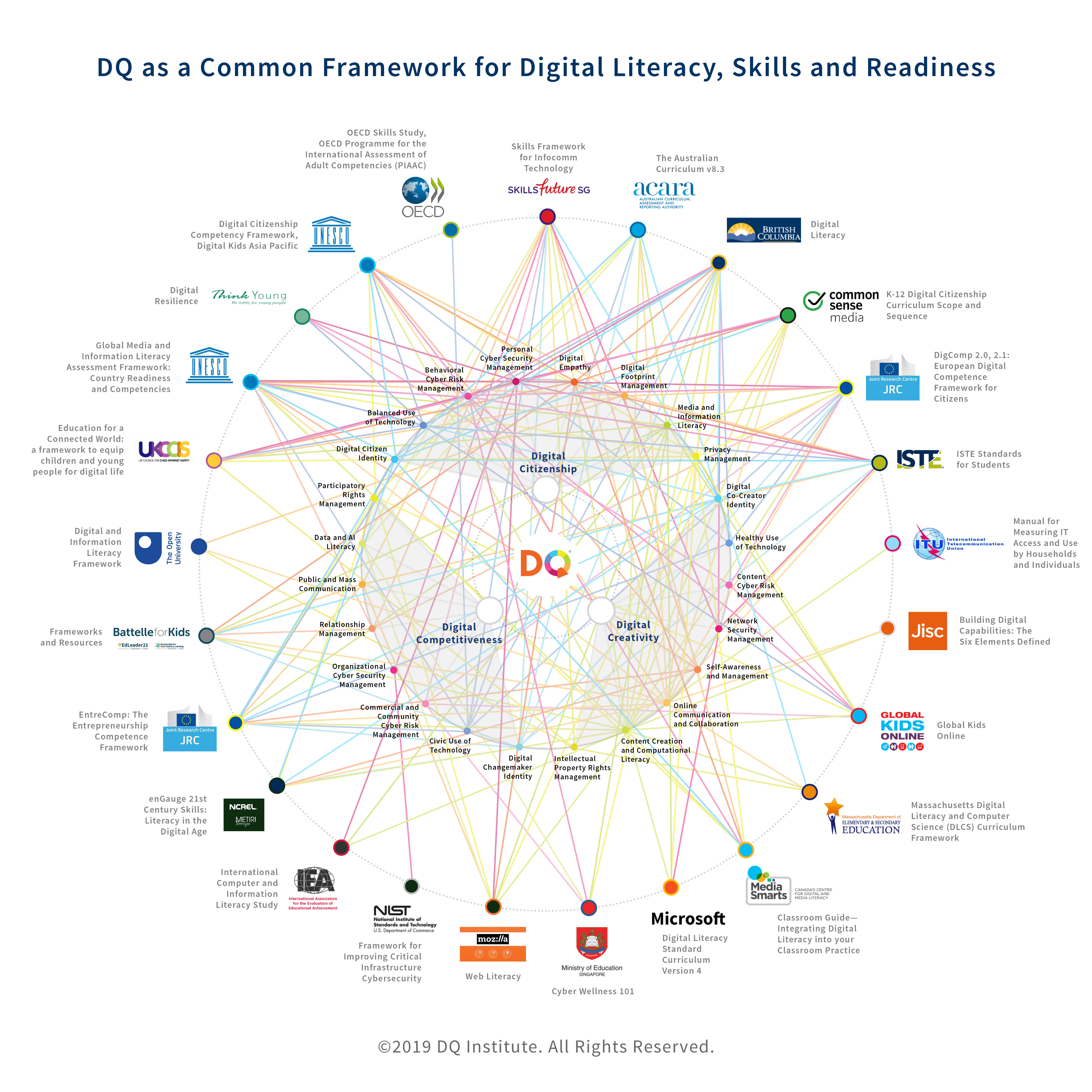
-
C
Certify a Program
Your program can undergo the DQ Seal process to gain certification on your program’s alignment with the IEEE DQ Global Standards. At the same time, your program will be included in the DQ program bank to likewise be an international benchmark program.

-
D
Develop an Assessment Tool
A white-labelled, customized API tool for assessment and scoring can be developed for you. Based on an AI-based linking and prediction methodology, your program can measure the levels of digital skills on an individual and organizational level as compared to national and global averages, and it can be linked with the DQ Index.
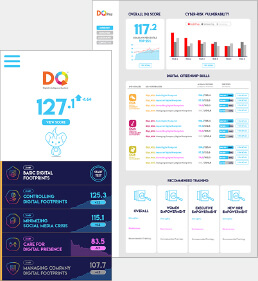
-
E
Evaluate the Impact
Based on the DQ Index, meaningful and quantifiable measurement on your program’s impact will be generated. Being part of DQ Index, your program will further help inform various stakeholders including policy makers in your nation and/or region in continuously identifying and closing the digital skills gaps.

Case Studies
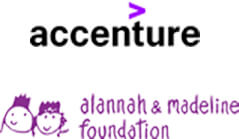
Overview:
Created by cyber safety experts, teachers and psychologists, the eSmart Digital Licence is a must-have online safety education program that teaches children good behaviour and how to deal with bad behaviour online.
Organization:
Accenture and Alannah and Madeline Foundation
Targeted Audience:
Children ages 10-14
Program Launch:
September 2021
Program:
Digital Licence 2.0
Accenture’s We’Q Framework
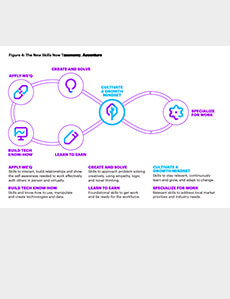
White-Labeled assessment API embeded in Digital Licence 2.0
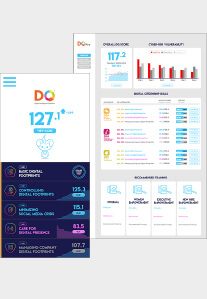
Thematic Area 1: COSI
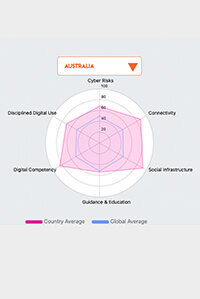

Overview:
The TikTok Family Safety Toolkit is embedded with easy-to-follow Digital Parenting Tips using its TikTok Family Safety Tools for parents to guide teens in becoming good digital citizens.
Organization:
TikTok
Targeted Audience:
Parents
Program Launch:
February 2021
Program:
TikTok Family Safety Toolkit
PM1, PM2, DQ7
DQ Global Standards
Enhancement of TikTok Family Safety Toolkit content
–
–

Overview:
The LEGO® Doom the Gloom experience teaches children about digital citizenship through fun and engaging online games and experiences. And the LEGO® Build & Talk activities are a series of challenges and tools to help parents to talk to their child about digital safety and wellbeing.
Organization:
The LEGO Group
Targeted Audience:
Children aged 8-12 (Doom the Gloom) Parents and children aged 6-10 (Build & Talk)
Program Launch:
February 2021
Program:
Doom the Gloom
Build & Talk
PM1, PM2, DQ3, DQ4, DQ5, DQ6, DQ7, DQ8
IEEE DQ Global Standards
Enhancement of LEGO Doom the Gloom and Build and Talk content
–
–
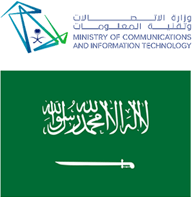
Overview:
The Ministry of Communications and Information Technology’s (MCIT) Digital Citizenship program aims to:
1. Assess, educate, and empower children aged 8-12 to become discerning digital citizens through DQ World.
2. Assess parents and citizens’ Digital Intelligence (DQ) using the DQ Pro
Organization:
MCIT
Targeted Audience:
Children aged 8-12
Program Launch:
September 2021
Program:
DQ World
DQ1-8
IEEE DQ Global Standards
Localization and customization of DQ World for Saudi Arabia children and citizens
White-labelled assessment API embedded in MCIT online portal
Thematic Area 1: COSI
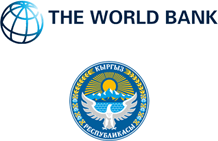
Overview:
Kyrgyz Republic Informatics Subject Standard for Grades 5 to 9 is the country’s curriculum as part of their national digital skills agenda.
Organization:
World Bank and Kyrgyz Republic
Targeted Audience:
Teens in Grades 5-9
Program Launch:
October 2021
DQ4, DQ7, DQ15, DQ16, DQ23
IEEE DQ Global Standards
UNESCO Digital Literacy Global Framework (DLGF)
CSTA Computer Science Standard (CSTA)
Microsoft COVID-19 Global Skills
Estonia National Curriculum for Upper Secondary Schools
Russia Computer Science Curriculum for 7-9 Grades of Educational Organizations
Enhancement of KR Informatics Subject Standard
Development of Assessment tool for students
Thematic Area 3: Digital Skills Assessment for Lifelong Learning

Overview:
Iowa Digital Literacy: Critical Thinking Tools that Make Sense was designed to help develop critical thinking skills that will equip the youth to engage in media consumption safely and responsibly.
Organization:
The Partnership for a Healthy Iowa
Targeted Audience:
Children and teens aged 8-18
Program Launch:
2018
Program:
Iowa Digital Literacy: Critical Thinking Tools that Make Sense
DQ1, DQ2, DQ7
IEEE DQ Global Standards
Alignment of Iowa Digital Literacy: Critical Thinking Tools
–
–
Collaborative
R&D
We are building an international collaborative R&D network to develop the DQ Index as a standardized and searchable metrics to monitor global, national, and local progress on digital intelligence, and identify the digital skills gap. Currently, there are several international- and national-level initiatives across sectors with a similar vision of closing digital skills gap and advancing digital intelligence. This goal is to build an efficient, coordinated, and comprehensive collaborative R&D network by connecting these ongoing initiatives and leveraging the strengths of each effort. Thus, the DQ Index is a culmination of various projects by integrating indices that measure digital performances, such as the G20 Measurement for Digital Economy, and the UN Sustainable Development Goals. Here, we have highlighted some of our collaborative projects with partners in each pillar of the DQ Index.
2021 NUS: National Digital Wellbeing
Collaborator: National University of Singapore – Centre for Trusted Internet and Community (NUS-CTIC)
Aim of the Project: Through the project, NUS-CTIC aims to review and identify key dimensions and indicators of digital wellbeing, as well as collect empirical data that would provide empirical data of diverse populations and their experiences with digital wellbeing
Definition of “Digital wellbeing”: Digital wellbeing is not just about skills, empowerment, subjective and social wellness, and physiological state. We consider it as an umbrella term that encompasses various indicators discussed above as it includes a multifaceted approach in characterising the term. Given these considerations, we define digital wellbeing as:
- Crafting and maintaining a healthy relationship with technology that can be used in a balanced and civic way
- Identifying and understanding the positive and negative impacts of engaging with digital activities
- Being aware of ways to manage and control factors that contribute to digital wellbeing

Proposed Framework on Digital Wellbeing
SkillsThe ability to confidently, critically, and consciously identify, understand, and use digital tools and technologies in everyday settings.
IdentityThe ability to establish a holistic and differentiated online and offline identity.
Empowerment
& AgencyThe ability to pursue and decide on personal goals and decisions; the ability to proactively engage with society and sustain meaningful online interactions through digital tools and technologies.
| Digital Safety & Security The ability to critically identify, understand, and manage different levels and kinds of digital threats while being able one’s identity, data, and wellbeing online within a safe digital environment. | Digital Rights & Responsibilities The ability to be accountable online, to uphold human and legal rights using technology, and critically dealing with personal information. | Digital CommunicationThe ability to establish clear and effective modes of communication that would allow expression and collaboration through technologies in order to achieve intended goals. | Digital Emotional IntelligenceThe ability to critically recognise, evaluate, and express one’s emotions as well as demonstrate empathy towards other people in digital interactions and environment. | Digital CreativityThe ability to create and reimagine knowledge and technologies into reality through ICT tools and innovations. | Digital Health & Self-CareThe ability to be aware of one’s physical and psychological wellbeing and maintain a healthy relationship when using technology. | Digital ConsumerismThe ability to fair, informed, and equitable choice in the online market while being protected with consumer rights. | Digital Employment & EntrepreneurshipThe ability to identify and use opportunities to acquire competencies to improve professional life and contribute to the global economy. |
Digital Activism/Civic ParticipationThe ability to spur and participate in cause-oriented groups and initiatives that affect meaningful changes in digital and physical environments; the ability to be protected against dis/misinformation while being informed with relevant and validated data. |
|---|---|---|---|---|---|---|---|---|
| Safe and Secure useThe ability to use digital tools efficiently to manage cyber-risks and cyber threats, protecting digital content and digital infrastructures. | Rights and Responsibilities OnlineThe skills required to observe and practice various rights and responsibilities of digital life. | Communicative LiteracyEffectively and efficiently communicate online through various forms of multimedia. | Emotional LiteracyUse and comprehend digital emotional jargons and cues (e.g. emoticons, like, share, etc.); identify emotional situations and contexts online. | Creative Literacy and ExpressionUse, recognise, and understand digital and creative tools and social media platforms. | e-Health LiteracyThe attitudes and skills required to access information and understand the consequences of digital consumption to ensure better physical and mental health. | Consumer Awareness and LiteracyUse and browse advertisements, goods, information, and services online; learn and understand novel digital commercial practices. | Productivity SkillsAttitudes and skills required to learn and develop economic competencies to accomplish goals in professional life. | Digital Political LiteracyThe competency and ability to politically recognize, use, and evaluate digital platforms, tools, and content. |
| Secure Identity ManagementBuilding and maintenance of a digital identity through safe, responsible and ethical behavior online. | Responsible Netizen IdentityBuilding a digital persona that uphold human rights online. | Participation and Identity FormationResponsibly articulate and express and manage thoughts and identities; positively impacting and establishing self-image and organization’s reputation online. | EmpathyEmotionally and ethically aware and sensitive of one’s self and others; emotionally supportive and available for other people’s needs and concerns. | Content Creation and EvaluationCreate and develop digital content by executing plans to creative outputs; engage and decide on problems through creative solutions; express identity through creative means. | Self-care and ReputationControlled and effective use of digital technologies offline and online to set examples for balanced use of technology. | Autonomy and Data ManagementTransact and manage identity and preference data in digital markets; assess and achieve subjective wellbeing. | Career IdentityDeveloping an identity through exploring and contributing to the digital economy. | Digital Political IdentityDeveloping a sense of political identity through exploring and contributing to social movements online. |
| Safe Online ParticipationWork towards a safe and secure a common digital environment by developing protocols and promoting best practices. | Digital Footprint ManagementCapacities to take rightful and responsible decision to manage digital footprints to shape evolving digital culture. | Collaboration and CommunicationCollaborate with people of different cultural backgrounds and from distant places; engage with public figures and institutions; taking part in online social movements that positively impact communities. | Solitary and Relationship ManagementDevelop genuine relationships as well as bridge differences online that create a sense of alterity and belongingness. | Digital Creativity and InnovationReimagine and rethinking existing digital tools and content; produce creative solutions and ideas that positively impact communities as well as spur meaningful experience through digital means. | Healthcare and Social wellbeingAssertion of organizational and community practices that promote and ensure healthy use of digital tools and online platforms for improving individual and social wellbeing. | Consumer Rights and CompetenciesAssert consumer rights and responsibilities in the digital marketplace; introduce innovative business practices that foster collaboration and maintain genuine customer-seller relations. | Innovation and EntrepreneurshipBeing part of a digital ecosystem to innovate and transform the global economy to build new opportunities for sustainable employment and entrepreneurship. | Digital Political ActivismEngaging in politically motivated activities through online consumption, participation, fundraising, and hacking. |
“Wellbeing is central to our personal health and the health of our societies. Having a balanced sense of self makes us more resilient to cultural and social complexities. It improves our quality of life and fosters the cohesion of our communities.
NUS-CTIC’s aim is to promote research towards a more trusted Internet and community. Key here is the role of digital literacy to enhance digital wellbeing. The DQ Index provides a barometer to evaluate these competencies.” – Audrey Yue, Deputy Director (Research)
- Download: the whitepaper by NUS CTIC
- Read: the NUS-DQI Digital wellbeing Project
2021 World Bank: Enhanced Digital Skills for Lifelong Learning
Collaborators: World Bank Europe and Central Asia , Ministry of Education and Science in the Kyrgyz Republic
Aim: This project aims to assess, build capacity, and empower schools and teachers to enhance their delivery of digital education and literacy for students’ lifelong learning and readiness in a global knowledge-based economy.
- Download the Report: 5-Step-Strategy for Building National Digital Skills Roadmap

2021 Singtel: Digital Enablement
Collaborators: Singtel
Aim: COVID-19 has heightened the urgency to support all citizens of Singapore in an inclusive way including seniors, SMEs, social sectors, and persons with disabilities with digital skills. Especially, it is important for them to know how to deal with unintended consequences in the digital world exacerbated by COVID-19. Singtel is developing in collaboration with the DQ Institute the “Digital Enablement Impact Framework” to understand and measure its different commercial and social efforts with various partners to enhance citizens’ digital intelligence.

2021 Singapore SkillsFuture, Gnowbe: Workforce Digital Skills
Collaborators: Singapore SkillsFuture, Gnowbe
Aim: The DQ Institute is collaborating with Gnowbe in aligning their Micro-learning Courses (MLCs) that are focused on developing future-ready skills with the IEEE DQ Global Standards. This collaboration will further enhance the relevance, credibility and accessibility of micro-badges for digital skills globally and will support Gnowbe’s microlearning and micro-authoring platform to enable more organizations in automating and quickly scaling access to digital skills micro-badges to include those without access to computers via smartphone.

2021 City of London, Ed-En Hub: Workforce Digital Skills
Collaborators: City of London, Ed-En Hub
Aim: ED-EN HUB ED-EN HUB is an Erasmus+ project co-financed by the European Union and developed by a consortium made up of 8 institutions from 5 different European countries. It aims to create, test, and diffuse collaborative education-enterprise approaches for the identification, development, and assessment of emerging skill gaps, with a focus on transversal and transferable competences.
A toolkit for the joint development of transversal and transferable competences:

Link: http://edenhub.eu/

2020 G20 Measurement for Digital Economy & Child Online Safety
Collaborators: G20 Digital Economy Task Force and G20 Civil Society (C20)
Aim: This project aims to support the G20 Digital Economy in developing the common measure for the 2020 G20 Measurement for Digital Economy by suggesting the inclusion of digital empowerment, wellbeing, and sustainability indicators to the existing indicators of the Measurement through the collaboration of 750+ civil societies.

2020 IEEE Standardization for the DQ Global Standards
Collaborators: IEEE Standard Association, Singtel, Singapore SkillsFuture, Korea IFEZ (Incheon Free Economic Zone)
Aim: This project aims to develop the IEEE Standards for digital literacy, digital skills and digital readiness based on the 2019 DQ Global Standards Report.

2020 EQUALS – Gender Digital Skills Gap
Collaborator: EQUALS Digital Skills Coalition
Aim: This project aims to develop a strategy to close the gender digital skills gap through a multi-stakeholder collaboration.
- Visit: EQUALS website


